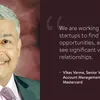Trends, ties and teams: how fintech startups can master the route to scale
Market positioning, partnerships, and an innovative culture can help startups ride the fintech boom, according to this panel of experts and mentors.
The fintech sector seems to be in the middle of a perfect storm, with a range of drivers and enablers converging: technological innovations, policy, millennial use of digital media, and globalisation. Success in this fast-moving, competitive field calls for effectively riding market trends, forming broad and deep partnerships, and leading high-performance teams.

Afthonia panel: Is India ready for a fintech revolution?
Fintech incubator Afthonia Lab recently hosted a panel discussion in Bengaluru on the occasion of its launch. As panel moderator, here are my takeaways from the discussion featuring Tanul Mishra, CEO and Founder of Afthonia Lab; Trent Landes, Assistant Director at the Fidelity Life Association; Karan Mishra and Matthew O’Mara, Co-founders of Spraoi; Rahul Sarin, IAS (retired), Public Policy and Government; and Kishore Chand, Partner, Gilda.vc
I. Trends
Availability of big data, the democratisation of analytical tools, government regulations, and willingness to form partnerships are some of the key drivers of fintech today. Availability of data and insights can unearth new possibilities more easily, such as helping those who have problems keeping up with credit card payments, Trent explained.
Statistic models for financial analysis and forecasting have been around for decades, but accessibility of infrastructure and solutions is opening up access to wider audiences of innovators and consumers, according to Karan. The appetite for banks and insurance companies to get into the game has also increased.
“There is the belief that the firms can’t do it themselves, that they need to find partners, that innovation is not going to come from within. They absolutely need to look outside and there is a willingness to partner to get there. There is a willingness to invest,” Matthew added.
The fintech marketplace itself has matured. “Until five or six years ago, fintech as a space was only really associated with digital payments,” observed Kishore. But today, a number of startups are expanding into areas like lending and funding.
Other trends to watch are the growing opportunity for fintech in rural India, and the pro-active promotion of fintech hubs in various states in India. Other issues of concern are the role of regulatory sandboxes in dealing with cryptocurrency, and privacy laws regarding ownership, storage, movement and security of data.
II. Ties
The panellists highlighted the importance of partnerships as a strategy for startups to gain advanced technology, data sets, and business customers. “Accelerators in India have gained prominence in the last couple of years with the opportunity of scalability,” Tanul explained.
Startups gain a lot from incubators and accelerators when it comes to business mentors, investor connects, and quality control with respect to technology standards and UX (see YourStory’s Startup Hatch series of accelerator and incubator profiles). Partnerships help gain market access to organisational customers for B2B players. Industry associations like NASSCOM and TiE offer useful partnership avenues for startups looking to connect with corporates.
The beauty of B2B payments is their frequency, ticket size, and interaction with customers as compared to B2C, according to Tanul. “If you are a payment-processing company, it might make sense for you to look at the logistics industry,” she explained, also pointing to agri-tech insurance and student loans as targets.

III. Teams
Startup teams need to be diverse, well rounded and have complementary skill sets, with a sense of shared purpose and mission. The relationship between co-founders is more critical than the relationship of marriage, some of the panellists joked. There should be agreement on the problem perspective, solution outcome, and the definition of success.
Even the choice of clients and investors is important at the early stages. “The day you bring in your first investor is like the day you bring in your first in-law. Never underestimate the power of an investor,” Kishore cautioned.
“The investors should be true strategic partners who can help open doors,” Karan urged. “It’s very easy to try and be everything to everyone, but it’s very important to be focused,” he cautioned, with respect to choice of client.
A client willing to share the right kind of data is important if data acquisition is a priority, for example. “But a wrong client could be as detrimental as anything else you could do, even though it seems like a good opportunity at the time,” he cautioned.
Founding teams should focus on innovativeness and high performance in execution, without compromise in quality, Rahul stressed. He cited Nobel Laureate Lawrence Summers in this regard: “Things take longer than you think that they will, and things happen faster when you think that they won’t.”
Whether dealing with a client or regulator, team dynamics is important. “The team is more important, at some level, than your concept,” Karan observed. Teams should be flexible, agile and quick, Tanul added. Team members should also be able to call each other out during disagreements, and not automatically assume that everyone is on the same page.
Startup teams should figure out how to use tools that reduce operational burdens. As examples, Rahul pointed to the Khata Book app for account management and Numberz app for invoice generation.
At the end of the panel, the audience weighed in with questions on job prospects in the fintech sector, and taxation laws. The panellists urged the government to come up with better sandbox regulatory approaches, and avoid ham-handed ways in which angel tax rules have been applied.
In sum, the fintech sector as an enabler for the wider economy offers a range of opportunities, as the ecosystem continues to become more diverse and rich. India’s smartphone user base is projected to increase from 700 million today to more than a billion by 2025, according to Rahul.
“The entire world is watching India,” Matthew observed. The opportunity to leapfrog infrastructure thanks to digital bodes well for the fintech sector.
“When we combine finance and technology, the scope of innovations is humongous,” Tanul summed up. “Our aim is to create solid businesses that can draw on the global network horizons that we have,” she explained.
(Edited by Rekha Balakrishnan)










